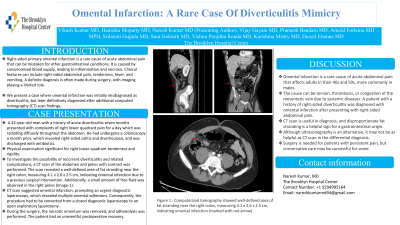Tuesday Poster Session
Category: Colon
P3060 - Omental Infarction: A Rare Case of Diverticulitis Mimicry
Tuesday, October 24, 2023
10:30 AM - 4:00 PM PT
Location: Exhibit Hall

Has Audio

Naresh kumar, MD
Brooklyn Hospital Center
Brooklyn, NY
Presenting Author(s)
Vikash Kumar, MD1, Hamsika Moparty, MD1, Naresh kumar, MD1, Vijay Gayam, MD1, Praneeth Bandaru, MD1, Arnold Forlemu, MD, MPH1, Srilaxmi Gujjula, MD1, Vishnu Poojitha Ronda, MBBS, MD2, Karishma Mistry, MD3, Denzil Etienne, MD1
1Brooklyn Hospital Center, Brooklyn, NY; 2Mahatma Gandhi Medical College and Research Institute, Pondicherry, India, Brooklyn, NY; 3Creighton University, Omaha, NE
Introduction: Right-sided primary omental infarction is a rare cause of acute abdominal pain that can be mistaken for other gastrointestinal conditions. It is caused by compromised blood supply, leading to inflammation and necrosis. Clinical features can include right-sided abdominal pain, tenderness, fever, and vomiting. A definite diagnosis is often made during surgery, with imaging playing a limited role. We present a case where omental infarction was initially misdiagnosed as diverticulitis, but later definitively diagnosed after additional computed tomography (CT) scan findings.
Case Description/Methods: A 42-year-old man with a history of acute diverticulitis seven months presented with complaints of right lower quadrant pain for a day which was radiating diffusely throughout the abdomen. He had undergone a colonoscopy a month prior, which revealed right-sided colitis and diverticulosis, and was discharged with antibiotics. Physical examination significant for right lower quadrant tenderness and rigidity. To investigate the possibility of recurrent diverticulitis and related complications, a CT scan of the abdomen and pelvis with contrast was performed. The scan revealed a well-defined area of fat stranding near the right colon, measuring 4.1 x 2.6 x 2.5 cm, indicating omental infarction due to a previous surgical intervention. Additionally, a small amount of free fluid was observed in the right pelvis (Image-1). CT scan suggested omental infarction, prompting an urgent diagnostic laparoscopy, which revealed multiple omental adhesions. Consequently, the procedure had to be converted from a closed diagnostic laparoscopy to an open exploratory laparotomy. During the surgery, the necrotic omentum was removed, and adhesiolysis was performed. The patient had an uneventful postoperative recovery.
Discussion: Omental infarction is a rare cause of acute abdominal pain that affects adults in their 40s and 50s, more commonly in males. The cause can be torsion, thrombosis, or congestion of the mesenteric vein due to systemic diseases. A patient with a history of right-sided diverticulitis was diagnosed with omental infarction after presenting with right-sided abdominal pain. CT scan is useful in diagnosis, and disproportionate fat stranding is a helpful sign for a gastrointestinal origin. Although ultrasonography is an alternative, it may not be as helpful as CT scan in the differential diagnosis. Surgery is needed for patients with persistent pain, but conservative care may be successful for some.

Disclosures:
Vikash Kumar, MD1, Hamsika Moparty, MD1, Naresh kumar, MD1, Vijay Gayam, MD1, Praneeth Bandaru, MD1, Arnold Forlemu, MD, MPH1, Srilaxmi Gujjula, MD1, Vishnu Poojitha Ronda, MBBS, MD2, Karishma Mistry, MD3, Denzil Etienne, MD1. P3060 - Omental Infarction: A Rare Case of Diverticulitis Mimicry, ACG 2023 Annual Scientific Meeting Abstracts. Vancouver, BC, Canada: American College of Gastroenterology.
1Brooklyn Hospital Center, Brooklyn, NY; 2Mahatma Gandhi Medical College and Research Institute, Pondicherry, India, Brooklyn, NY; 3Creighton University, Omaha, NE
Introduction: Right-sided primary omental infarction is a rare cause of acute abdominal pain that can be mistaken for other gastrointestinal conditions. It is caused by compromised blood supply, leading to inflammation and necrosis. Clinical features can include right-sided abdominal pain, tenderness, fever, and vomiting. A definite diagnosis is often made during surgery, with imaging playing a limited role. We present a case where omental infarction was initially misdiagnosed as diverticulitis, but later definitively diagnosed after additional computed tomography (CT) scan findings.
Case Description/Methods: A 42-year-old man with a history of acute diverticulitis seven months presented with complaints of right lower quadrant pain for a day which was radiating diffusely throughout the abdomen. He had undergone a colonoscopy a month prior, which revealed right-sided colitis and diverticulosis, and was discharged with antibiotics. Physical examination significant for right lower quadrant tenderness and rigidity. To investigate the possibility of recurrent diverticulitis and related complications, a CT scan of the abdomen and pelvis with contrast was performed. The scan revealed a well-defined area of fat stranding near the right colon, measuring 4.1 x 2.6 x 2.5 cm, indicating omental infarction due to a previous surgical intervention. Additionally, a small amount of free fluid was observed in the right pelvis (Image-1). CT scan suggested omental infarction, prompting an urgent diagnostic laparoscopy, which revealed multiple omental adhesions. Consequently, the procedure had to be converted from a closed diagnostic laparoscopy to an open exploratory laparotomy. During the surgery, the necrotic omentum was removed, and adhesiolysis was performed. The patient had an uneventful postoperative recovery.
Discussion: Omental infarction is a rare cause of acute abdominal pain that affects adults in their 40s and 50s, more commonly in males. The cause can be torsion, thrombosis, or congestion of the mesenteric vein due to systemic diseases. A patient with a history of right-sided diverticulitis was diagnosed with omental infarction after presenting with right-sided abdominal pain. CT scan is useful in diagnosis, and disproportionate fat stranding is a helpful sign for a gastrointestinal origin. Although ultrasonography is an alternative, it may not be as helpful as CT scan in the differential diagnosis. Surgery is needed for patients with persistent pain, but conservative care may be successful for some.

Figure: Image -1 : Computerized tomography showed well-defined area of fat stranding near the right colon, measuring 4.1 x 2.6 x 2.5 cm, indicating omental infarction (marked with red arrow)
Disclosures:
Vikash Kumar indicated no relevant financial relationships.
Hamsika Moparty indicated no relevant financial relationships.
Naresh kumar indicated no relevant financial relationships.
Vijay Gayam indicated no relevant financial relationships.
Praneeth Bandaru indicated no relevant financial relationships.
Arnold Forlemu indicated no relevant financial relationships.
Srilaxmi Gujjula indicated no relevant financial relationships.
Vishnu Poojitha Ronda indicated no relevant financial relationships.
Karishma Mistry indicated no relevant financial relationships.
Denzil Etienne indicated no relevant financial relationships.
Vikash Kumar, MD1, Hamsika Moparty, MD1, Naresh kumar, MD1, Vijay Gayam, MD1, Praneeth Bandaru, MD1, Arnold Forlemu, MD, MPH1, Srilaxmi Gujjula, MD1, Vishnu Poojitha Ronda, MBBS, MD2, Karishma Mistry, MD3, Denzil Etienne, MD1. P3060 - Omental Infarction: A Rare Case of Diverticulitis Mimicry, ACG 2023 Annual Scientific Meeting Abstracts. Vancouver, BC, Canada: American College of Gastroenterology.
